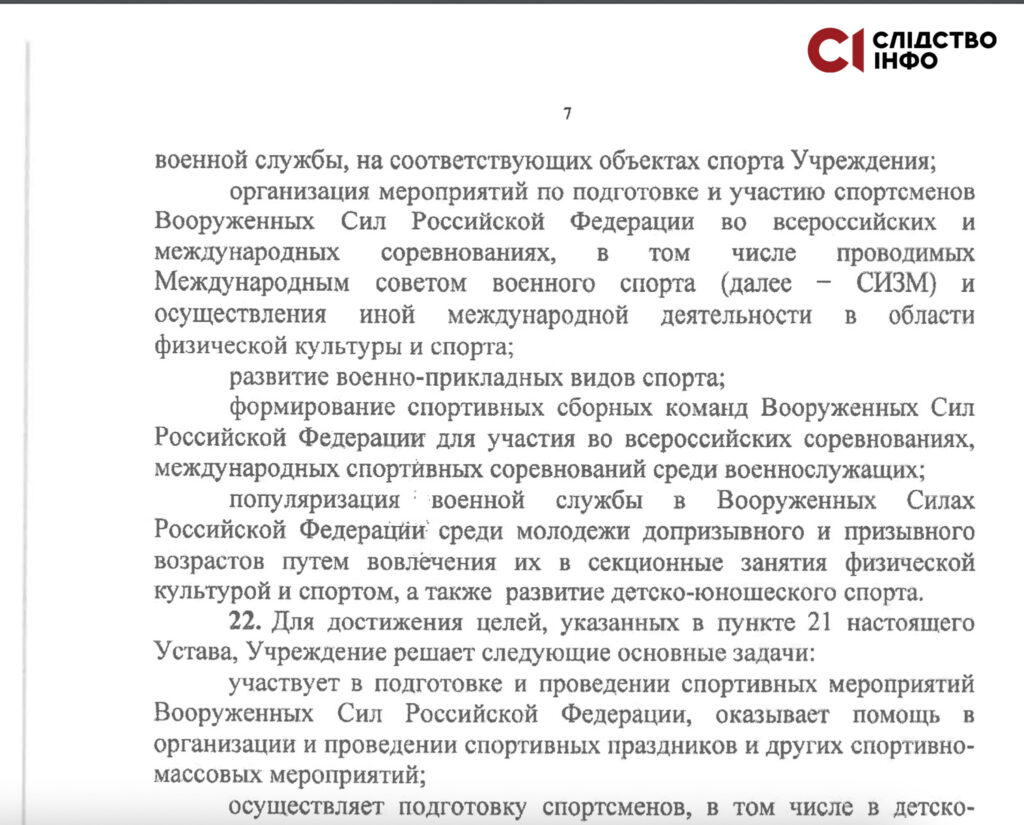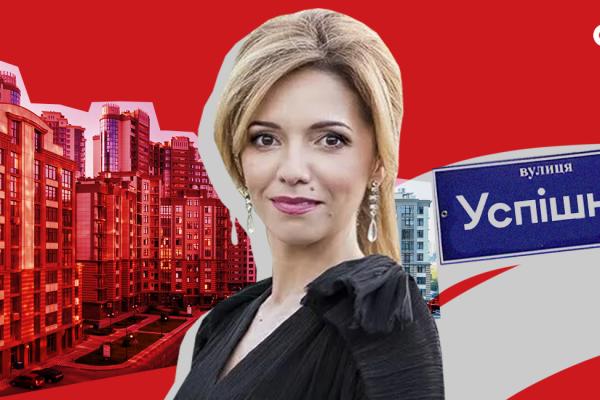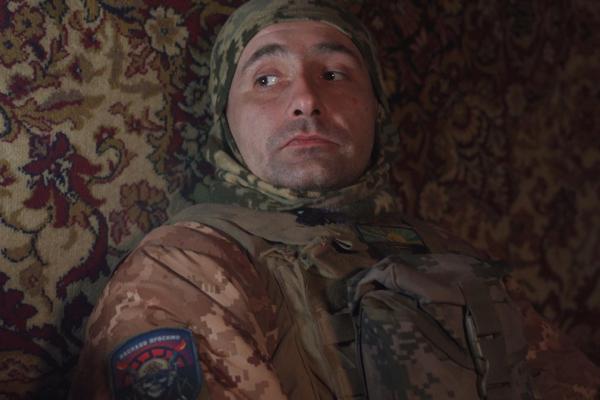Russian Olympic athletes receive salaries from the Russian Ministry of Defense, have military ranks, and actively spread propaganda of the aggressor state. Despite this, reputable international organisations are trying to provide them with access to the world’s major sports arenas.
This is described in a new video by Slidstvo.Info. The video has English subtitles.
In the summer of 2024, the Olympic Sports Games will be held in Paris. The International Olympic Committee suggested allowing Russian athletes to participate in the Olympics under a neutral flag. This caused an outrage in Ukraine, and the European Parliament condemned such intentions of the Olympic Committee.
The journalists of Slidstvo.Info carefully studied the charters and social networks of Russian sports organisations, and also received certificates of salaries of Russian athletes. It turned out that Russian Olympians are active military personnel who receive money from the Russian Ministry of Defense. Their task is to promote military service in Russia through international sports competitions.
THE OLYMPIANS IN MILITARY UNIFORM
Russian Olympians regularly appear in public in military uniforms and receive military awards. For example, Russian biathlete Eduard Latypov participated in the Beijing Olympics in 2022. He missed the target during the final of the competition and won bronze. The unsuccessful performance did not upset the biathlete, as he received an award from the Russian Armed Forces at home.
- Russian Olympian Eduard Latypov
- Russian Olympian Eduard Latypov received a medal from Russian Defense Minister Shoigu
On April 29, 2022, when the Russian army was already engaged in active hostilities on the territory of Ukraine, Olympian Eduard Latypov received the rank of lieutenant and the Order of Merit, 2nd Class, from Russian Defense Minister Shoigu.
Latypov is an active serviceman and a member of the Central Army Sports Club, who receives a salary from the Russian Defense Ministry. Slidstvo.Info managed to find documents confirming that in 2021, the man received 776,081.6 rubles (≈ 10 075,71 US dollars) from the FAI of the Russian Defense Ministry CSKA (Federal Autonomous Institution of the Ministry of Defense of the Russian Federation Central Sports Club of the Army). At the time, Latypov had the rank of warrant officer, but now, as a lieutenant, he receives a higher salary.

A screenshot of Eduard Latypov’s salary
Another Russian Olympian, gymnast Denis Ablyazin, who represented Russia at the 2020 Tokyo Olympics, received the Order of Honor award from Putin after the Olympics, as well as the Medal for Valor, First Class, from General Viktor Zolotov of the Russian National Guard. As of 2021, Denis Ablyazin held the rank of senior lieutenant, according to the official website of Rosgvardia (transl. – National Guard of Russia).
- Russian Olympian, gymnast Denis Ablyazin
- Gymnast Denis Ablyazin receives an award from Russian dictator Vladimir Putin
In a comment to Slidstvo.Info, Ablyazin said that information about his title is confidential: “This is confidential information, I am no longer a senior lieutenant.”
Other Olympians, skiers Alexander Bolshunov and Denis Spetsov, were promoted to the rank of captains by the leadership of Rosgvardia for their medal places at the Beijing Olympics in 2022. Journalists found their photos on the official website of the military structure, which is fully involved in the war in Ukraine.
- Russian skiers Alexander Bolshunov and Denis Spetsov
- Russian skier Alexander Bolshunov
- Russian skier Denis Spetsov
The same military structure that is currently fighting in Ukraine and captured 52 residents of the Russian-occupied districts of Kherson and Zaporizhzhia regions last September.
According to the Center for Strategic Communications, “At the Winter Olympics in Beijing in the year of the full-scale invasion, Russian athletes won 32 medals. Of these, the CSKA team won 14 medals, and their teammates from Dynamo (transl. – all-Russian sports society) won the same number. In total, 88% of all awards at the Beijing Olympics in 2022 were won by athletes representing the security forces fighting in Ukraine.”
THE STRUCTURE OF RUSSIAN SPORT
The fact that Russian athletes are also military personnel is not a coincidence, but part of the system in which Russian sport has existed for many years.
Sport in Russia has always been a part of the country’s military life. Ever since the Soviet Union, there have been sports clubs such as CSKA (Central Sports Club of the Army) and Dynamo.
Back then, CSKA was subordinated to the Sports Committee of the USSR Ministry of Defense, and Dynamo was subordinated to the NKVD (transl. – People’s Commissariat for Internal Affairs; the government-ruled law enforcement agency in the USSR combining both public order and secret police activities).
These clubs were founded in 1923, 100 years ago, but little has changed in Russian sports since then.
In today’s Russia, most athletes also belong to Dynamo and CSKA. The founders of these clubs are the Ministry of Defense, the FSB, the Rosgvardia, the Ministry of Internal Affairs, and other law enforcement agencies.
That is why so many Russian Olympians are also military personnel with military awards and ranks.
This is stated in the CSKA charter: “The institution is subordinate to the Ministry of Defense of the Russian Federation and is part of the structure of the Armed Forces of the Russian Federation”. And the organisation’s goal is to “develop physical culture and sports in the Armed Forces of the Russian Federation. And the development of international activities in the field of physical culture and sports”.

Screenshot of CSKA’s charter
SALARIES OF RUSSIAN OLYMPIANS
On the archive page of CSKA’s website, there is a photo of Russian swimmer Anton Chupkov from the recruits’ oath of office. He is a bronze medalist at the 2016 Olympic Games and a world champion swimmer.
From the salary certificate of the Olympic lieutenant Anton Chupkov, Slidstvo.Info learned that in 2021 he received 1,428,609.57 rubles (≈18 529,07 US dollars) from the FAI of the Russian Federation’s CSKA. This is not the only source of income for the athlete, but an allowance for the “title”.
Track and field athlete and captain of the Russian Armed Forces Maria Lasitskene received 1,641,122.42 rubles (≈ 21 285,36 US dollars) from CSKA in 2021.
- Anton Chupkov’s salary screenshot
- A screenshot of Maria Lasitskene’s salary
The information provided by the sources shows that the salary of athletes depends on their military rank. The higher the rank, the higher the salary.
In general, the Russian Ministry of Defense does not save on salaries for athletes. This is also stated in the CSKA charter: “the department must pay full remuneration to its personnel”. And the figures from their annual report show that almost 3 billion rubles were allocated for salaries for CSKA athletes and staff in 2021.
- A screenshot of the CSKA charter
The question arises: how can Russian Olympians remain neutral in the war and carry a neutral flag (as suggested by the International Olympic Committee) if they receive a salary from the same agency that finances Russian aggression?
WHY DOES THE RUSSIAN ARMY PAY ATHLETES?
Journalists tried to understand what the money the Russian army pays athletes is used for.
Obviously, the Olympians are not digging trenches near Bakhmut in Donetsk Oblast. They have a different function: to advertise the Russian Armed Forces so that Russians would join the military and enlist.
This is directly stated in the charter of CSKA, which pays money to Olympic athletes. The purpose of the agency is to “popularize military service in the Armed Forces of the Russian Federation among young people of conscription and pre-conscription age.”

A screenshot of the CSKA Charter
Photos and videos from the Internet confirm that even during the war in Ukraine, Russian Olympians held workshops as part of the “Contract Military Service is Your Choice” campaign and recorded a series of messages of support to Russian soldiers currently fighting in Ukraine, with the hashtags “ZaPatsanoV, ZaPobedu (transl. – literally “for guys”, “for victory”), heroeZ”.
- On the screenshot: CSKA athletes held a workshop in Kostroma (a city in the Russian Federation) as part of the “Military Service under Contract – Your Choice!” campaign
Russian athletes not only actively spread propaganda, but also train in the territories occupied by Russia. For example, immediately after the Russian occupation of Crimea, CSKA opened a branch there and set up a training base. Right now, young Russian athletes are serving in sports companies on the temporarily occupied Ukrainian peninsula, and they may go to the Olympic Games in a year.
Thus, Russian Olympic athletes receive salaries from Russian law enforcement agencies and openly campaign for service in the Russian army, which is currently committing crimes in Ukraine. These are the same athletes who, in fact, are accomplices in the attack on Ukraine, and they can use the status of neutral Olympians and retain access to international venues.

















